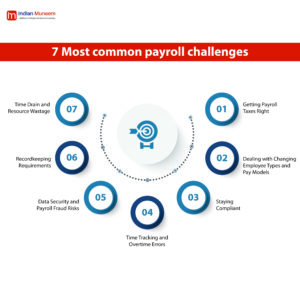Payroll might look simple from the outside, just paying employees on time, right? However, anyone who has managed it knows that payroll management is one of the most stressful, error-prone, and compliance-heavy tasks a business handles. One small mistake? It can mean penalties, frustrated employees, or worse, scrutiny from tax authorities.
As your business scales across borders, employee types, and payment models, so do the complications.
That’s why many companies in New Zealand, Australia, Singapore, the US, UK, Canada, and across Europe are no longer trying to do it all in-house. They’re switching to outsourced payroll management to reduce headaches and reclaim their time.
What exactly are these recurring payroll headaches? And how does outsourcing fix them?
Let’s walk through the seven most common payroll management challenges, and how outsourcing solves each one.
7 Most Common Payroll Management Challenges

1. Tax Calculations Are a Moving Target
Every country has its own payroll tax rules. Even within countries, there may be different rates or filing requirements at the regional level. Miss a tax update, and you could face interest, penalties, or worse, audits.
How Outsourcing Helps
Payroll outsourcing providers stay current with tax law changes. They apply the right rates for PAYE in NZ, National Insurance in the UK, CPF in Singapore, and other region-specific rules. With an outsourced team, tax updates are handled automatically, you stay compliant without chasing rulebooks.
2. Juggling Different Employee Types
Permanent staff. Contractors. Casual employees. Interns. Gig workers. Remote employees from another country. Everyone comes with their own set of rules for taxes, benefits, overtime, bonuses, and hours.
And hybrid or global teams have only made this more complex.
How Outsourcing Solves It:
An experienced payroll outsourcing team can competently manage multiple pay structures simultaneously. It may be someone on a fixed monthly salary or someone working on an hourly basis; they can automate all calculations correctly to ensure that every employee is paid the correct number of hours or amount, while also ensuring each employee is correctly classified.
This also reduces your liability, because a misclassified employee is a big red flag to tax authorities.
3. Payroll Compliance Is Complex and Local
Laws around minimum wage, paid leave, overtime, severance, and contributions vary greatly. Missing any of them can lead to lawsuits or government penalties.
How Outsourcing Helps
Outsourced payroll teams have compliance checklists baked into their systems. They monitor changes in employment law and adjust payroll rules accordingly, so your business isn’t caught off guard.
For example, we work closely with accounting and legal advisors, serving clients across multiple sectors, including various agricultural and financial sectors, and helping clients remain compliant with all local and international labor legislation.
4. Time Tracking and Overtime Errors
Tracking employee hours manually can result in errors, especially when antiquated or unlinked systems are involved. Most companies are aware of the need to ensure accuracy across employee pay when managing pay, taxes, and compliance.
How Outsourcing Helps
Modern payroll providers use integrated systems that sync employee time tracking with payroll calculations. This ensures accuracy in regular hours, overtime, and leave balances.
5. Data Security and Payroll Fraud Risks
Payroll data includes names, addresses, tax IDs, bank info, and salaries—a goldmine for hackers. On top of external threats, insider fraud (like ghost employees or unauthorized bonuses) is a growing concern.
How Outsourcing Helps
Outsourced payroll partners invest heavily in encrypted systems, user access controls, and audit trails. They enforce role-based access, data encryption, and cloud backups that meet GDPR and other global standards.
6. Recordkeeping Requirements
Countries vary in their recordkeeping requirements and the length of time payroll records must be retained. For example, in the US, the IRS requires records for 4 years; in the UK, it requires records for 3 years. If you don’t have the proper documentation, it could lead to fines during audits.
How Outsourcing Helps
Outsourcing providers securely store and manage payroll data in accordance with local record retention laws. That means you’re always audit-ready.
7. Time Drain and Resource Wastage
If you’re still manually entering hours, checking tax slabs, and generating payslips every month, it’s probably costing your business way more than you realise.
Your finance team could spend their time on budgeting, forecasting, and financial analysis rather than on payroll administration. Or, you could just avoid hiring one more person purely for payroll.
How Outsourcing Can Solve This
With outsourcing, you get to scale without increasing your overhead. You do not have to hire, train, or manage additional payroll staff. Instead, you tap into an existing team who knows your business, learns your systems, and does the job without your team lifting a finger.
And when your outsourced provider also offers integration with your accounting software or timesheets, you eliminate double-entry and save even more time.
Finally
Global compliance, tech integration, and risk reduction make outsourcing an easy decision. It’s not just about lowering costs, it’s about running a more professional, stress-free operation.
At Indian Muneem, we specialize in payroll support for accounting firms and growing businesses across NZ, AUS, SG, US, UK, and beyond. Whether you’re a CA/CPA firm interested in extending your services to payroll or a business leader who wants to experience clean and compliant payroll every time, we’ve got you covered.
Let us remove the burden of payroll so your team can focus on what matters most.




